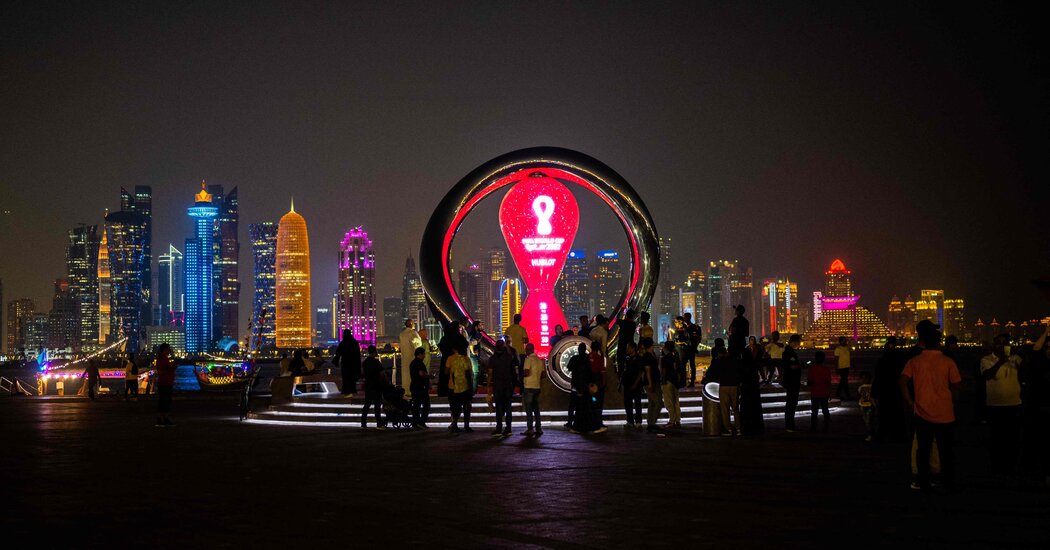JERUSALEM — Israelis will be permitted to fly directly between Israel and Qatar during the soccer World Cup this month, officials from both nations announced on Thursday, in the latest sign of warming ties between Jerusalem and some Arab governments.
As part of the deal, Qatar will permit Israeli diplomats, under the umbrella of a private travel company, to provide consular support to Israelis during the tournament. The Israeli public broadcaster, Kan, has also been allowed to set up a temporary studio in Doha to provide Israeli viewers with coverage of the matches.
The full details were not available, but those moves, gleaned from interviews and separate statements from Israel and FIFA, soccer’s governing body, fell well short of creating formal diplomatic relations between Israel and Qatar. The Gulf state has ruled out full normalization with Israel until the creation of a Palestinian state.
The gestures also have precedent: Israel and Qatar have publicly cooperated on low-level diplomatic and economic issues since the 1990s. But according to the Israeli Foreign Ministry, there have never been direct flights between the two countries.
The announcement mirrored a wider recent thaw between Israel and certain Arab governments that began two years ago. Then Bahrain, Morocco and the United Arab Emirates signed full normalization agreements with Israel, in deals brokered by the Trump administration. This year, Saudi Arabia also gave Israeli airlines permission to fly through Saudi airspace, in an arrangement brokered by the Biden administration.
Those shifts highlight how, for some Arab states, their national interests have become a more pressing priority than the immediate creation of a Palestinian state. For decades, most Arab countries refused to work with Israel until there was a resolution to the Israeli-Palestinian conflict, but the growing appeal of economic and military ties to Israel, coupled with mutual security concerns, has prompted some Arab leaders to rethink that approach.
The Qatari government, which has a fractious relationship with Bahrain and lingering tensions with the U.A.E., made clear on Thursday that any escalation of violence in Israel and the occupied territories during the tournament would lead to the cancellation of the flights.
Qatar has already put strict rules in place for visitors to the World Cup: Only people with match tickets and permits called Hayya cards will be allowed to visit. A Qatari official who insisted on the condition of anonymity to discuss sensitive issues also said the temporary opening to Israelis was purely to comply with FIFA hosting requirements.
Officials from Qatar and FIFA, the organizers of the World Cup, said that Palestinians would be allowed to fly to Qatar from an Israeli airport, but it was unclear how that premise would be carried out in time for the tournament, which starts in less than two weeks.
What we consider before using anonymous sources. Do the sources know the information? What’s their motivation for telling us? Have they proved reliable in the past? Can we corroborate the information? Even with these questions satisfied, The Times uses anonymous sources as a last resort. The reporter and at least one editor know the identity of the source.
A senior Israeli diplomat, Lior Hayat, said that the plan had yet to be fully mapped out. “There isn’t really a system for that,” Mr. Hayat said. “It was just agreed on this afternoon.”
Palestinians will still need to get approval from the Israeli government to fly out of and re-enter Israel, Mr. Hayat said — a lengthy process that can take weeks and sometimes months, if it is successful at all.
A spokeswoman for Hussein al-Sheikh, who leads Palestinian coordination with Israel, declined to comment.
The Israeli prime minister, Yair Lapid, said in a statement, “This is great news for football fans and for all Israelis.” But the statement made no mention of allowing Palestinians to fly to Qatar from Israel.
Qatar has fielded growing criticism from abroad as host of the tournament, particularly over the rights of the low-income migrant workers who built the country’s skyscrapers and stadiums, and over the treatment of L.G.B.T.Q. people, who face discrimination and potentially arrest in the autocratic monarchy. Some analysts have also raised concerns about whether the tiny country’s infrastructure is ready to handle the influx of more than a million fans.
Qatari officials say the country has improved rights for migrant workers. They appear to have grown increasingly frustrated with the criticism in recent weeks, with the emir, Sheikh Tamim bin Hamad, suggesting that it amounted to a campaign based on fabrication and double standards.
Though Israel and Qatar have never established full diplomatic ties, they have worked together publicly for more than two decades. In the late 1990s, Israel operated a trade liaison office in Doha, the Qatari capital, until tensions between Israelis and Palestinians led Qatar to shut it down.
Israeli and Qatari politicians have met several times, including in Qatar, and the Gulf state has often allowed Israeli sports players to compete in its territory. Israel does not have a team in this World Cup.
Israel has allowed Qatari officials to cross its territory to enter the Gaza Strip and to fund a soccer stadium in an Arab city in Israel. Qatar also mediates between Israel and militants from Hamas, the Islamist group in the Gaza Strip.
While public opinion in the Arab world generally opposes the normalization of ties with Israel, Qataris have a more favorable view of Israel than most Arabs, according to new polling by Keevon Global Research, an Israeli firm, and the Konrad Adenauer Foundation, a German political foundation and research group.
Nearly half of Qataris view Israel favorably, behind Emiratis, and far ahead of Bahrainis, Moroccans and Saudis, according to the research. Other polls have shown far more negative attitudes in the Gulf toward normalization with Israel.
Patrick Kingsley reported from Jerusalem, and Vivian Nereim from Riyadh, Saudi Arabia.
Sumber: www.nytimes.com








